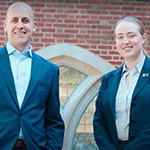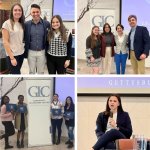

“I think for me, research and teaching are connected,” said Prof. Chipo Dendere. “I can't do research and not teach, and I can't teach and not do research.”
Dendere, an Africana Studies professor at Gettysburg, is passionate about studying and teaching African democracy and migration—learning about the international community so she can more holistically educate her students.
Originally from Zimbabwe, Dendere moved to the United States for college, quickly becoming a fiercely curious scholar, and eventually, earning a Ph.D. in political science. Before coming to Gettysburg, she worked with African policy makers on Capitol Hill and was also a consultant at The World Bank, where she primarily conducted data analyses on the financial institutions in Bangladesh.
All of these experiences have now led to her current teaching and research, which focuses on democratization.
“My primary research has been on democracy and migration. I study why people leave and the factors that influence people who leave home,” Dendere said.
Influenced by her personal experience as an immigrant and her academic background in political science, Dendere found herself drawn to research on mass African migration and the politics that affect the migratory patterns.
Her recent research efforts have involved new media and the role it plays in democratic systems both in the United States and in African countries.
“I've started working on some projects about the relationship between social media and democracy,” she said. “I've looked at the number of people that post about politics on Twitter and Facebook—and the people who engage online—to see if that action translates to real political action on the ground.”
Dendere’s research has provided her with knowledge about social media and the role it plays in democracy today, both in the United States and in the developing world—knowledge, which she is then able to share with her students.
“Social media matters—it increases political awareness, especially in less democratic countries were the media is censored,” Dendere said. “Social media gives young people access to engage, but as we’ve seen with the US election, social media participation is not enough. Those who engage online will need to become active citizens.”

Life at Gettysburg
Dendere came to Gettysburg to teach and conduct research through the Gondwe Scholars program, which aims to promote diversity within the faculty by providing recipients with the opportunity to conduct individual research projects while teaching classes.
“I think that my students appreciate my background because in class, we are able to talk beyond the textbook and I can give them real life examples,” Dendere said. “For example, the Gondwe lecture was wonderful because the speaker was actually my old boss from The World Bank. Being able to make those connections between the theoretical concepts and the real-world financial market is really important to me.”
The students she met during the interview process also drew Dendere to Gettysburg. “They were so engaged and asked some really insightful questions,” Dendere said. “This felt like a place where I could teach and make a difference—but I could also have a really good time! I just instantly fell in love with the school and the people.”

Hannah Dallman ’17, an Africana Studies major, describes the personal relationship she fostered with Dendere through their mutual passion for African culture.
“Chipo has become a mentor for me—someone I can talk to about my friends from Zimbabwe and my experiences abroad in South Africa,” Dallman said. “We’ve talked about her varied-career background. She was even able to give me the contact information of people that might be helpful to me in my own career search.”

With an engaged student body and lively class discussions, Dendere teaches her students how to understand and think critically about multidimensional issues like politics and democracy.
“Teaching about democracy and politics, it can be very uncomfortable because most people haven't thought about politics, and they may be scared to share their opinions because they don't want to be judged,” said Dendere. “My hope is that I am always able to create a safe space for all students— students of different and diverse political orientations, sexuality, race or religion.”
In light of the recent U.S. election, the discussions fostered in Dendere’s classroom have been politically fueled, and difficult at times.
“My students can look at both sides of an issue and have intelligent conversations with one another—that's what college is about,” said Dendere.
“In the past few weeks we have had some really hard discussions in class, but the thoughtful conversations and positive student feedback have only reaffirmed my love for Gettysburg—it’s why I chose to come here.
Gettysburg College’s first-class faculty embraces innovation and cutting-edge developments in their field. The benefit to students is clear: when professors are excited about and engaged with new thinking and discovery, they communicate this enthusiasm and knowledge in the classroom. Find out more about what our faculty members are researching, and how they use that research to engage students in the classroom.
Bringing a 16th-century love story to light
GMOs, bad and SMOs, good? Not so fast.
Prof. Amy Evrard on what we should know about women in the Muslim world
The toughest lady in the Wild West and other American folktales
Why social entrepreneurship? Prof. Chitvan Trevedi shares.
Writing my first opera: A reflection by Sunderman Prof. Avner Dorman
Questions even a professor can’t answer
A new use for drones: Eavesdropping


